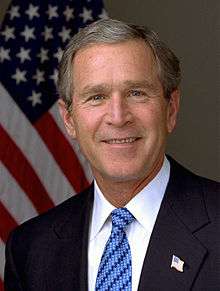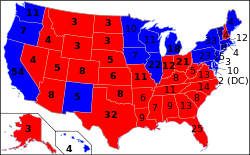US History/New Century
< US History2000 Election


As Clinton's presidency came to a close, Democrats nominated Al Gore, Clinton's vice president, as their nominee, and the Republicans chose George W. Bush, the governor of Texas and son of former President George H.W. Bush.
Florida had traditionally been a Democratic-leaning state, but explosive population growth in the late nineties had brought many social and economic conservative Cubans to southern Florida. The growth had left Florida very evenly split among the parties.
On election night, the news media outlets first predicted Florida to go to Gore, then to Bush, and then decided that the race was too close to call. Florida law provided for an automatic recount when votes differ by such a small margin, and when Florida decided that Bush had won, Gore sued Bush to force further recounts in several Florida counties. Bush counter-sued, and the case went to the Supreme Court of the United States. In a 5-4 decision, the Court decided that the state of Florida must recount all the ballots in all the Florida counties and not just those for which Gore had sued, in accordance with the Equal Protection Clause of the U.S. Constitution. As Florida was required by the Florida Constitution to certify its election within days of the Court's decision[1], there was not enough time to recount the entire state. Thus, the final state count stood, with Bush winning Florida by 537 votes, (and as a result receiving 271 electoral votes to Gore's 267, and therefore gaining the presidency), although he lost the popular vote.

Early Bush Administration Policy
Foreign Affairs
During the 2000 campaign, some had criticized George W. Bush on his qualifications in the realm of foreign relations as a state governor. One such incident which supposedly epitomized this lack of experience was when Bush was interviewed by a local television reporter and asked if he knew who the leader of Chechnya was and the name of the general who had recently taken over the government of Pakistan, to which Bush could not answer either. The perception early on in the Bush presidency was that his administration was relatively disinterested in foreign policy.
During the first eight months of his administration, one of the major issues concerned how to deal with North Korea, an issue which had also plagued his predecessor. On February 9, 2001, a U.S. Navy submarine, the USS Greeneville, collided with a Japanese fishing vessel, killing all nine aboard. President Bush promptly apologized for the incident.
The administration's first major foreign policy crisis came, however, on April 1, 2001, in the form of the Hainan Island incident, during which a U.S. Navy EP-3E ARIES II surveillance aircraft was forced to land at a Chinese military airport after colliding with a Chinese aircraft. One Chinese pilot was killed and the 24 member crew of the U.S. aircraft were detained by the Chinese government. The flight had occurred over a portion of the South China Sea over which the U.S. and China disagreed on the issue of U.S. naval overflights. The administration issued an apology for the death of the Chinese pilot as well as the entering of China's airspace to land, which the U.S. Ambassador Joseph Prueher said "did not have verbal clearance."
However, the early happenings of the Bush administration would be largely forgotten after the tragedy that struck one Tuesday morning.
The Closing Decade
As the decade closes, it is hard to say what people will say of it. There has not yet been a name picked for this new decade.